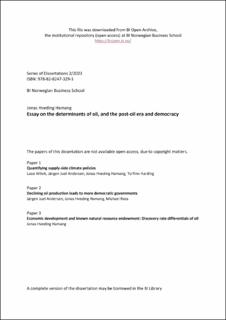Essay on the determinants of oil, and the post-oil era and democracy
Doctoral thesis
Published version
Permanent lenke
https://hdl.handle.net/11250/3066376Utgivelsesdato
2023Metadata
Vis full innførselSamlinger
Sammendrag
Quantifying supply-side climate policies
(by: Lassi Ahlvik, Jørgen Juel Andersen, Jonas Hveding Hamang, Torfinn Harding)
Abstract: What are the effects of supply-side climate policies? We use global company-level data to estimate the impact of 130 oil-tax reforms between 2000 and 2019 on oil production, exploration and discoveries. Higher taxes are found to reduce companies’ exploration expenditures and oil discoveries. We quantify the oil market implications and show that the existing productionbased taxes, averaging at 21%, reduce the long-term emissions by 1.3-2.7 GtCO2 annually. Increasing the global tax rate would reduce emissions almost linearly, by 0.16 GtCO2 per percentage point, while further shifting the distribution of rents from consumers to producers and governments.
-
Declining oil production leads to more democratic governments
(by: Jørgen Juel Andersen, Jonas Hveding Hamang, Michael Ross)
Abstract: Many oil-rich countries — such Russia, Saudi Arabia, Iran and Venezuela — are ruled by authoritarian governments. How will they be affected by a global transition away from fossil fuels? We address this question with a novel approach, analyzing political change in 36 oil producing countries that passed their historical production peak and experienced at least 10 years of declining production. Using new proprietary data on oil field life cycles and an event-study design, we find that once production began to fall these countries became significantly more democratic, relative to both the overall sample trend and the parallel pre-peak trends. Ten years after their oil peak, 33 of the 36 countries had become more democratic. After 15 years, their relative democracy scores increased by an average of 9 percentage points. For countries that transitioned after 1980, these scores rose about 13 percentage points, and for larger producers, by about 20 percentage points. Our findings suggest that a global transition toward renewable energy may make the governments of oilrich countries significantly more democratic. It may also cast light on the long-term effects of economic sanctions on oil-exporting countries like Russia.
-
Economic development and known natural resource endowment: Discovery rate differentials of oil
(by: Jonas Hveding Hamang)
Abstract: The location of oil reserves plays an essential role in policymakers’ incentives to coordinate supplyside climate policy. In this paper I use data on the location of all historic onshore petroleum discoveries to establish a new stylized fact: Economically developed areas are many times more likely to contain an oil or gas discovery, compared to undeveloped areas. I show that this result is not driven reverse causality or confounding geology. By implication, there exist large additional undiscovered oil and gas deposits in currently undeveloped areas, mainly located outside of Europe and North America. I quantify these deposits to be about 50% of total discovered onshore oil reserves.
Beskrivelse
This is an article based doctoral dissertation. Due to copyright matters, the open access file only contains the "mantel".
